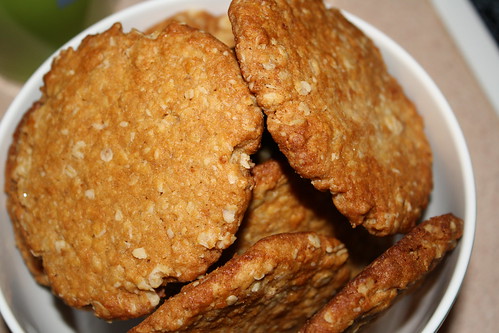Today (25 April) is ANZAC Day. Alongside Australia Day it is easily the most important national holiday here. It commemorates the first military action fought by Australian (and New Zealand troops). Australia was only federated in 1901 so when the First World War broke out the nation was a baby. In 1915, Australian and New Zealand troops were deployed to Turkey and they landed at Gallipoli on this day.
In theory, it was going to be a quick strike, but that single campaign was to last eight months and by the end of the year the allied troops had to be evacuated. Over 8000 Australians had been killed.
Today, ANZAC Day commemorates all Australian servicemen and women, and the national holiday and dawn services give everyone an opportunity to reflect on the commitment that those who serve give to their fellow countrymen.
Anyway, history lesson over. Let’s get to the biscuits (note, biscuits, NOT cookies). The story goes that these egg free biscuits were sent to troops by loved ones back in Australia. Food historians may wish to argue this point, and while I am normally a really tedious stickler for facts, in this instance I think we should let accuracy slide and just go with the collective wisdom.
This is my recipe for ANZAC biscuits. It’s not a tried and tested family recipe but one I created back in 2006. It is egg free but not dairy or gluten free. Apologies in advance for the imperial measurements and the mix of volume and weight measurements!
It’s a really simple recipe – so simple in fact that I made these biscuits this afternoon with my toddler.
Just remember – these are ALWAYS biscuits!
Ingredients
- ¾ cup dessicated coconut
- ½ cup caster sugar
- 1 cup oats
- 1 cup plain flour
- pinch of salt
- 4 oz unsalted butter
- 2 tbsp golden syrup
- 1 tsp bicarb
- 2 tbsp boiling water
Instructions
- Preheat oven to 180°C (convention).
- Mix the dry ingredients together in a bowl.
- On the stove, melt the butter and the golden syrup. Then add the bicarb and boiling water. The mixture will froth a little.
- Add the wet ingredients to the dry and mix well. You may need to add a little extra boiling water.
- Make large walnut sized balls of mixture and flatten on baking trays (lined with baking paper). The biscuits will spread as they cook, so ensure you leave ample space between them.
- Cook for 10-15 minutes. Less cooking leads to chewy biscuits, more cooking: crunchier biscuits.
- Makes approximately 18 biscuits.


If you search Trove (digitised Aust newspapers) for oatmeal cookies from 1914-20, there are 163 references to cookies during that time. It rather refutes your conjecture it was not a term in use at that time.
Thank you for taking the time to check out Trove on this. For those not familiar with it, trove.nla.gov.au is an awesome resource for anyone interested in any aspect of Australian history (& probably particularly genealogists!).
However, I’m not sure that I did conjecture that “cookie” was not in use in Australia in the period covering the First World War. Given that the OED notes that it’s an early eighteenth century word (derived from the Dutch) I’m sure it was in use throughout the English speaking world during this period.
However, it is primarily North American English (especially important as a ‘biscuit’ in the States is more like what we would call a ‘scone’) and I personally think we should avoid adopting Americanisms when we have perfectly decent words to express the equivalent idea. Especially with respect to something so entrenched in our own history. And especially as ANZAC Day commemorates the landing at Gallipoli in 1915 and the US didn’t enter the WW1 until 1917.
But really – this isn’t a blog on etymology and I’m pretty sure that I’ve been guilty of referring to biscuits as cookies on more than one occasion!